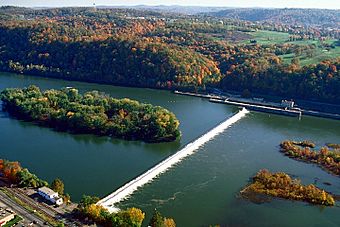Allegheny River Lock and Dam No. 3 facts for kids
Quick facts for kids |
|
|
C.W. Bill Young Lock and Dam
|
|
 |
|
| Location | Approximately 1 mile (1.6 km) north of Barrington, Harmar Township, Allegheny County, Pennsylvania and Plum, Pennsylvania |
|---|---|
| Built | 1932 |
| Architect | Vang Construction Company, Seeds & Derham |
| MPS | Allegheny River Navigation System MPS |
| NRHP reference No. | 00000397 |
| Added to NRHP | April 21, 2000 |
The C.W. Bill Young Lock and Dam is a special water structure on the Allegheny River in Harmar Township, Allegheny County, Pennsylvania, and Plum, Pennsylvania. It was built in 1932 and was once known as Allegheny River Lock and Dam No. 3. This lock and its dam were created by the United States Army Corps of Engineers to help boats travel safely along the river.
Contents
What is a Lock and Dam?
A lock and dam system helps boats move between different water levels on a river. Imagine a giant elevator for boats! The dam holds back water, creating a higher water level (called a pool) on one side. The lock is a chamber that can be filled with water or emptied.
When a boat wants to go upriver, it enters the lock. The gates close, and water fills the lock, lifting the boat to the higher water level. To go downriver, the process is reversed: water is let out of the lock, lowering the boat.
How the C.W. Bill Young Lock Works
The C.W. Bill Young Lock and Dam is located about 14.5 miles up the Allegheny River from Point State Park in Downtown Pittsburgh. Upriver from the dam, the water is about 734.5 feet above sea level. This higher water level stretches for about 9.7 miles up to Allegheny River Lock and Dam No. 4.
Downriver from the dam, the water is about 721 feet above sea level. This lower water level extends about 7.8 miles down to Allegheny River Lock and Dam No. 2. This means the C.W. Bill Young Lock helps boats go up or down about 13.5 feet between these two different water levels.
Parts of the Lock and Dam
The C.W. Bill Young Lock and Dam site includes several important parts that work together. These are called "contributing structures" because they all help the system function.
- The dam itself, which holds back the water.
- The lock, the chamber where boats are raised or lowered.
- An esplanade, which is a flat, open area, often for walking.
- The operations building, where the lock's controls are managed.
- A gauging station, which measures water levels.
- A lockkeepers house, where the people who operate the lock used to live.
Historic Lockkeepers' Houses
Around 1907, two two-story houses were built for the lockkeepers who worked at the earlier lock and dam structures. One of these older houses, located at 301 Barking Road, is still standing today. It gives us a peek into the history of the people who helped keep the river open for travel.
National Historic Site
On April 21, 2000, the C.W. Bill Young Lock and Dam was added to the National Register of Historic Places. This is a special list of places in the United States that are important for their history, architecture, or archaeology. Being on this list helps protect the site and recognize its value to the nation's heritage.



